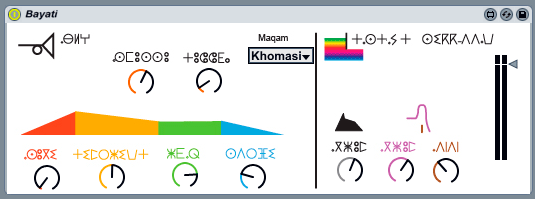Could a piece of software make you think differently about sound? Could it reflect ideas, the culture of listening?
The developers of the SUFI series of plug-ins seem to think so. In place of screencasts showing which knob to turn which way, they head with a video crew to Morocco. The “instruction” might be about the value of reflection or call to prayer, about living as much as how to use a tool. You can see the first two examples: a meditation on the idea of daily interruptions in the soundscape coming from God, and a collection of electronic drones set to a beautifully-shot backdrop. The interfaces are rendered in graphics and (for the vast majority of us) a foreign language, and instead of reverting to the conventions of plug-in design, they assimilate ideas from another culture about tonality and function.
The plug-ins will be released for Max for Live on the 8th of May, and VST plug-ins later on. (Some version of the Max for Live plug-ins are available now – links at bottom.) The collection includes:
- DEVOTION, lowering your volume five times a day at the time of call to prayer
- A drone machine (in the second video, sounding quite nice)
- Four soft synths tuned to Arabic maqam scales. (They describe these as “North African maqams,” but I believe the tuning should be consistent with the use of maqam elsewhere around the Mediterranean and Arabic world.
- One drum machine amidst the synths, Palmas, with a hand-clapping UI (see screenshot).
You have a week to practice learning to read neo-Tifinaght Amazigh script.
Updated: There are in fact no references in the videos here to Sufism, but the creators respond to questions about why they selected this name on their FAQ. As with the videos above, collaborations and friendship inspired their thinking. They write:
The title is an homage to several Moroccan Sufi musicians we’ve worked with over the years who influenced our thinking about musicianship & sound itself, as well as a way of foregrounding the complex but largely unremarked relationship between faith and technology. We’re fascinated with how software and digital environments encode cultural values and beliefs by conditioning choices and framing possibilities. For example, If Apple is a secular religion, selling contemporary magic, then should that change the way we feel about – and engage with – its operating system? The spirit of Sufi aphorisms, we hope, is manifest in these plug-ins. At a literal level, many of the roll-over infotexts come from Sufi verse.
Apart from being an interesting “cross-cultural” exercise, though, these plug-ins can serve as a reminder of two things. First, design choices are constrained only by your imagination. Aside from any perceived cultural values, you can really make software do, theoretically, anything – and make any sound. Convention can be a useful tool, but it can also become a prison. Second, the creators consider VST compatibility as a way to reach users in the Middle East and Africa. Whether this particular effort is successful or not, those are massive and growing audiences. (To anyone reading there, by the way, hello from way up at this end of the Northern Hemisphere!) Of course, these plug-ins will be just as foreign to nearly all of that audience as it is to, say, producers in Melbourne or London, but as we watch the videos from Morocco, it’s worth considering just how small our Internet-connected planet is – and how wonderfully-vast the spaces between us, and the possibility contained there, remains.
Software can serve for a medium for collaboration, as in this case, which ties together a variety of backgrounds from traditional producer to Amazigh musician. The Amazigh people, tying together modern Arabic culture and language with Phoenician roots (much like my own Lebanese ancestry), represent a rich practice of music. Just as the remote, historical world of J.S. Bach might direct a modern software plug-in, these can, too – and in living fashion.
The work is led by Jace Clayton (DJ Rupture), with programmer Bill Bowen, designer Rosten Woo, Amazigh musician Hassan Wargui , and videographers Maggie Schmitt and Juan Alcón Durán. The creators report that “a physical Sufi Plug Ins Forever Box is expected for late 2012, and Clayton is currently preparing an installation version of the Sufi Plug Ins.”
Mark your calendar for next Tuesday, or join the mailing list at the site. More information:
http://www.beyond-digital.org/sufiplugins/
Thanks, Jesse Engel!
As seen on maxforlive.com (thanks, David):
Devotion: http://www.maxforlive.com/library/device/1140/devotion
Drone: http://www.maxforlive.com/library/device/1139/drone
Palmas: http://www.maxforlive.com/library/device/1138/palmas
Hijaz: http://www.maxforlive.com/library/device/1137/hijaz
Bayati: http://www.maxforlive.com/library/device/1136/bayati
Saba: http://www.maxforlive.com/library/device/1134/saba
Khomasi: http://www.maxforlive.com/library/device/1133/khomasi

